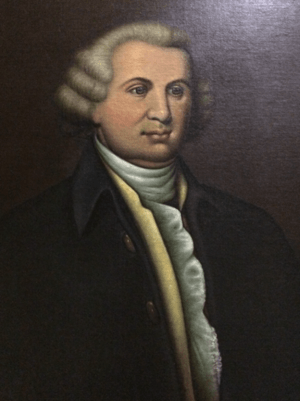John Penn (North Carolina politician) facts for kids
Quick facts for kids
John Penn
|
|
|---|---|

John Penn
|
|
| Born | May 17, 1741 |
| Died | September 14, 1788 (aged 47) |
| Resting place | Guilford Courthouse National Military Park |
| Occupation | lawyer |
| Known for | signer of the United States Declaration of Independence |
| Signature | |
John Penn (born May 17, 1741 – died September 14, 1788) was an important person in early American history. He is known as a Founding Father of the United States. John Penn signed two very important documents: the United States Declaration of Independence and the Articles of Confederation. He signed these papers as a representative for North Carolina.
Contents
Early Life and Education
John Penn was born in Caroline County, Virginia, near a place called Port Royal. He was the only son of Moses and Catherine Penn. John went to a regular school for only two years. His father did not think that a lot of schooling was very important.
When John was 18, his father passed away. After this, John studied law on his own. He learned from his uncle, Edmund Pendleton, who was a lawyer. By 1762, John Penn became a lawyer in Virginia.
Family Life
On July 28, 1763, John Penn married Susannah Lyne. They had three children together. Their daughter, Lucy, later married John Taylor of Caroline. He was another important political leader from Virginia.
A Leader for Independence
In 1774, John Penn moved to Stovall, North Carolina. He quickly became involved in politics there. In August 1775, he was a representative at North Carolina's Third Provincial Congress. This was a meeting where leaders discussed important issues for the colony.
From 1775 to 1780, John Penn was chosen to be a delegate for North Carolina. He served in the Continental Congress. This was a group of representatives from the American colonies. They met to decide how to deal with Great Britain.
During his time in the Continental Congress, John Penn signed two very important documents. He signed the Declaration of Independence, which declared America's freedom. He also signed the Articles of Confederation, which was the first plan for the United States government. After his time in Congress, he continued to work as a lawyer until he passed away in 1788.
Legacy and Recognition
John Penn's contributions to the United States are remembered today. A naval ship, the USS John Penn, was named in his honor.
In 1936, a special historical marker was put up near his home in Stovall. This marker honors John Penn and his importance. It was the very first historical marker that the state of North Carolina ever put up.
See also
 | William L. Dawson |
 | W. E. B. Du Bois |
 | Harry Belafonte |

